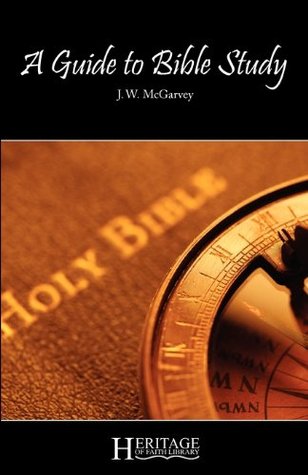- Bible
- Read the Bible
- Bible Versions
- Verse of the Day
- Reading Plans
- Verses by Topic
- Books of the Bible
- Bible Images
- Study
- Commentaries
- Concordances
- Dictionaries
- Encyclopedias
- Sermons
- Bible Atlas & Maps
- BP Wiki
- Devotionals
- Today's Devotionals
- Light of the World
- All Devotionals
- Inspirational Quotes
- More
- Picture Quotes
- Videos
- Inspirational
- Bible Study
- What The Bible Says
- Bible Q&As
- Daily Bread
- Bible by Genre
- Bible Stories
- Random Bible Verse
- Community
- Store
A Guide to Bible Study
by J.W. McGarvey
This handbook is designed to afford suggestion and assistance to those who desire a fuller and more accurate knowledge of the Bible. It gives a brief summary of facts regarding the making and the purpose of the Bible; its chief divisions; short sketches of the various books, serving as introductions to their study; and various other material of an interesting and helpful sort to the reader and student of the Bible. The book has its purposes and its limitations. The former has been noted. The latter was set by the desire to put all the material into such a brief and convenient form that the little volume could be in reality what its name implies, a handbook, constantly kept at hand for reference and suggestion. Introduction by Herbert L. Willett.
BUY NOW
Kindle Edition, 160 pages
Published May 17th 2012 by DeWard Publishing Company, Ltd. (first published 1897)
© 2026 Bibleportal.com All rights reserved.

John William McGarvey was born in Hopkinsville, Kentucky, March 1, 1829. His father was born in Ireland, and, when grown, came to America, and settled at Hopkinsville, Kentucky, where, with a small capital, he went into the dry-goods business.
In April, 1847, J.W. McGarvey entered the Freshman Class of Bethany College. While at college he made the good confession, and was immersed, by Professor PENDLETON, in April, 1848. So soon as he became a Christian, he determined to devote his life to the preaching of the Gospel, and it was not long before he gave very conclusive evidence of fitness for the work. In July, 1850, he graduated as one of the honor men. At the call of the Church in Fayette, Brother M'GARVEY gave up his school, and, in September, 1851, was ordained to the work of the ministry, and afterward preached for the Church at Fayette and neighboring county churches until February, 1853, when he removed to Dover, Lafayette County, Missouri.
He resided at Dover nine years, and, during this period, he spent about half of the time at home, and, the remainder, preaching extensively over the State of Missouri, holding five public debates with various religious parties; he also collected money to erect a boarding-school in his village, and conducted the school two years.
In the spring of 1862, he accepted the pastoral care of the Church in Lexington, Kentucky, where a large field of usefulness was open to him. During the same year he published his " Commentary on Acts," which had occupied all the time he could devote to it for three and a half years. This is a work of decided merit, and at once fixes his reputation as a fine Biblical scholar.
... Show more